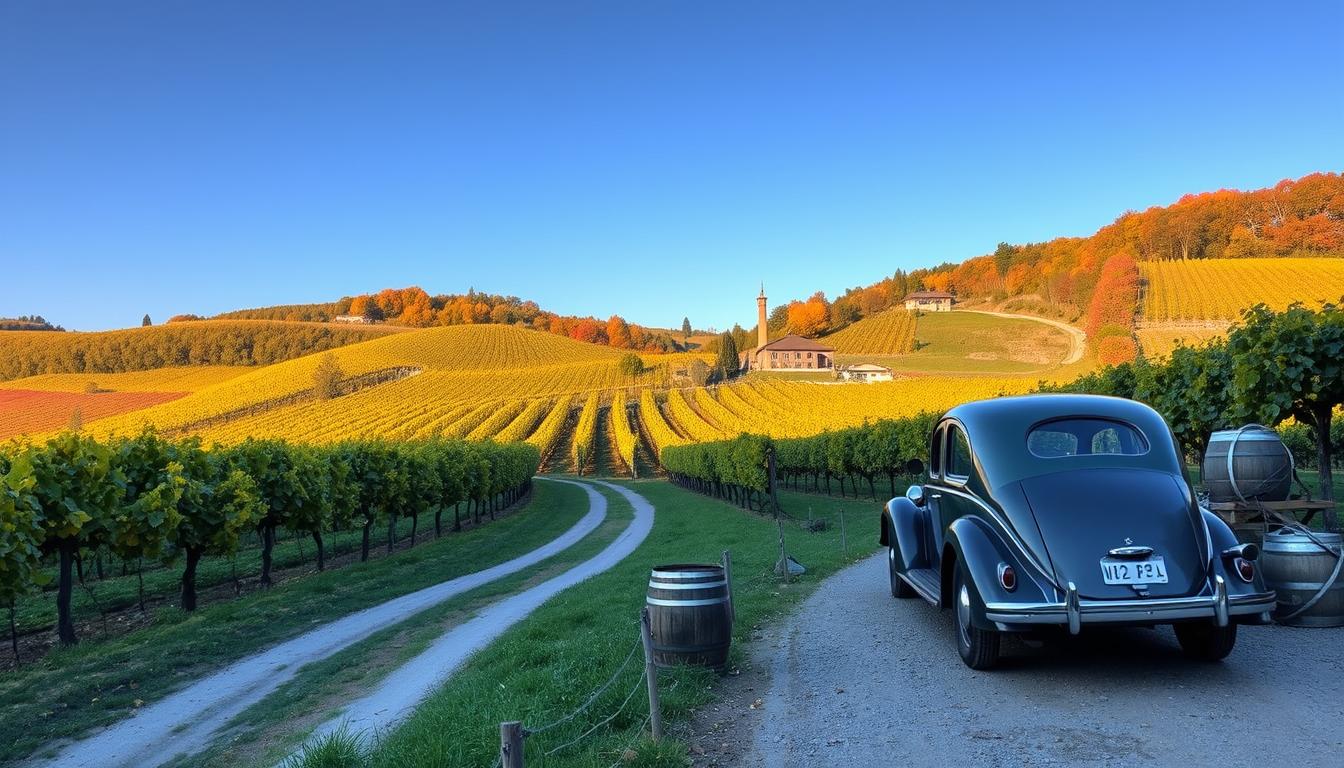Starting a wine tour business in Piedmont Italy is a rewarding journey. This region is famous for its wine heritage, beautiful landscapes, and top wines like Barolo and Barbaresco. This article will guide you through the process, covering legal needs, logistics, and marketing tips. You’ll learn how to create unforgettable Italian wine tours.
Key Takeaways
- Piedmont Italy is a vital hub for wine tourism, offering unique regional wines.
- Understanding the local culture and wine characteristics can enhance tour experiences.
- Legal requirements must be carefully navigated when starting a business in Italy.
- Networking with local wineries is essential for establishing partnerships.
- Marketing your wine tour effectively can attract diverse customer demographics.
- Creating an engaging business plan will set the foundation for your venture.
Overview of the Wine Industry in Piedmont
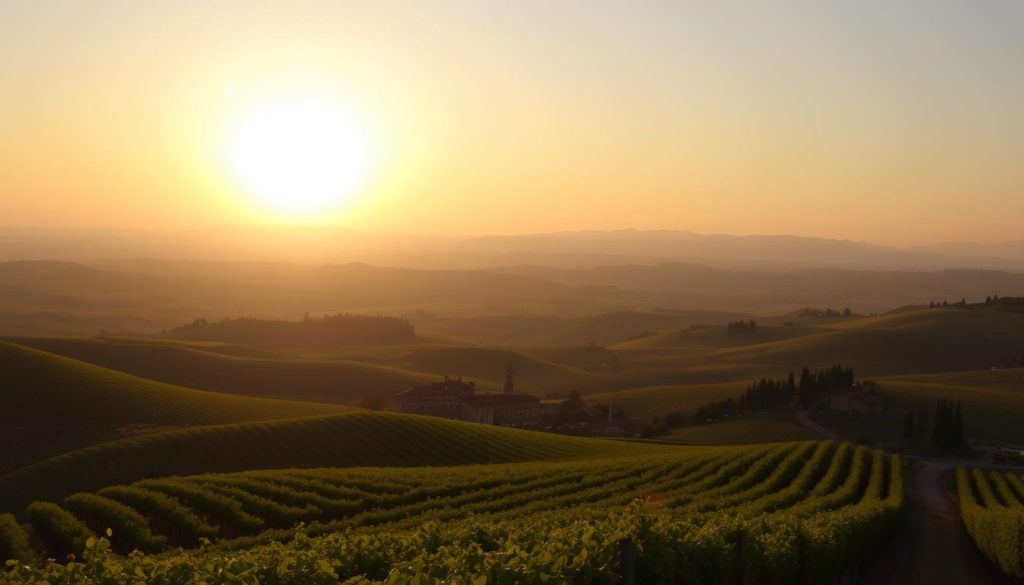
Piedmont is known for its rich wine history and Italian wine culture. Its unique geography, with the Alps and Apennines, creates a perfect terroir. The region’s wine history is marked by the creation of Barolo and Barbaresco denominations.
These events highlight the evolution of winemaking and the role of influential families and cooperatives. They have shaped Piedmont’s wine heritage.
Historical Background of Piedmont’s Wine Culture
The history of Piedmont’s wine dates back to ancient Roman times. The local grape varieties and climate fostered a vibrant wine culture. The 20th century saw regulations that improved the quality of wines like Barolo and Barbaresco.
This history shows the region’s legacy and its dedication to making exceptional wines. It combines innovation with tradition.
Key Wine Regions and Grape Varieties
Piedmont is famous for its diverse wine regions. Areas like Barolo, Barbaresco, and Asti are known for their landscapes and grape varieties. Here are the main grape varieties:
- Nebbiolo – The noble grape behind the prestigious Barolo and Barbaresco wines.
- Dolcetto – Known for its fruit-forward profile and easy drinkability.
- Barbera – Renowned for its bright acidity and versatility across various styles.
The climate and soil of Piedmont greatly influence the taste and style of its wines. This makes the Piedmont wine experience unique.
Why Choose Piedmont for Your Wine Tour Business?
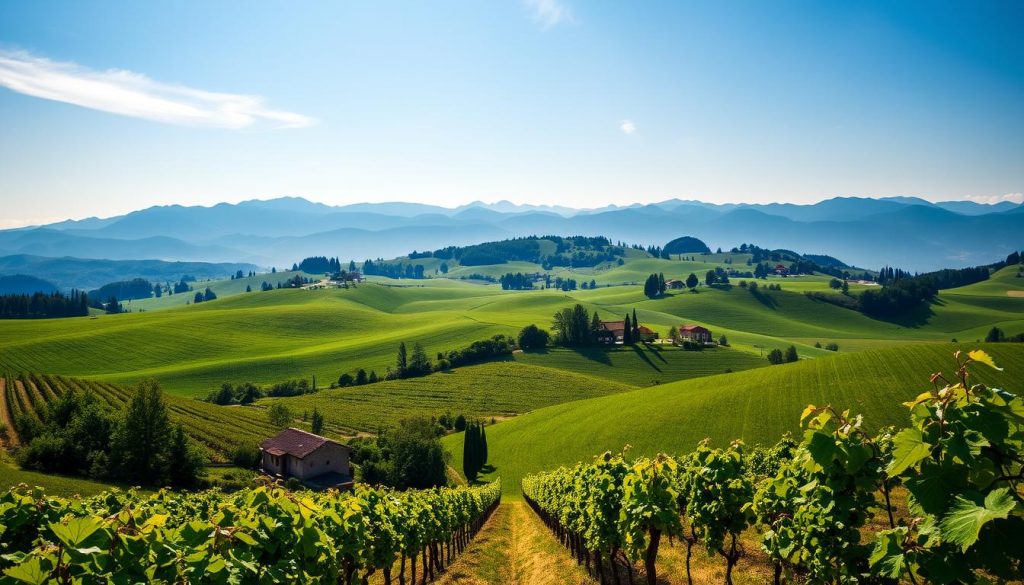
Piedmont is a top pick for wine tours, thanks to its unique charm. It offers amazing wines, beautiful views, and a rich history. These features make it a hit with tourists looking for more than just wine.
Visitors love exploring quaint villages and ancient castles. These experiences add to the magic of Piedmont. It’s a place where wine tasting meets cultural discovery.
The Unique Selling Points of Piedmont
Piedmont shines with several standout features:
- It’s famous for top wines like Barolo and Barbaresco, loved by all.
- The scenery of rolling hills and vineyards is breathtaking.
- Michelin-starred restaurants serve gourmet meals paired with local wines.
- It’s less crowded than places like Tuscany, offering a more personal experience.
Comparative Analysis with Other Italian Wine Regions
In an Italian wine regions comparison, Piedmont is unique. Tuscany is well-known but faces more competition, making it busier. Piedmont, on the other hand, offers a more authentic and peaceful experience.
Its beauty and traditions make it a favourite for wine tours. It’s a place where tourists can really connect with wine makers and enjoy special tours. This makes Piedmont a strong contender in the Tuscany vs Piedmont debate.
Starting a Wine Tour Business in Piedmont Italy
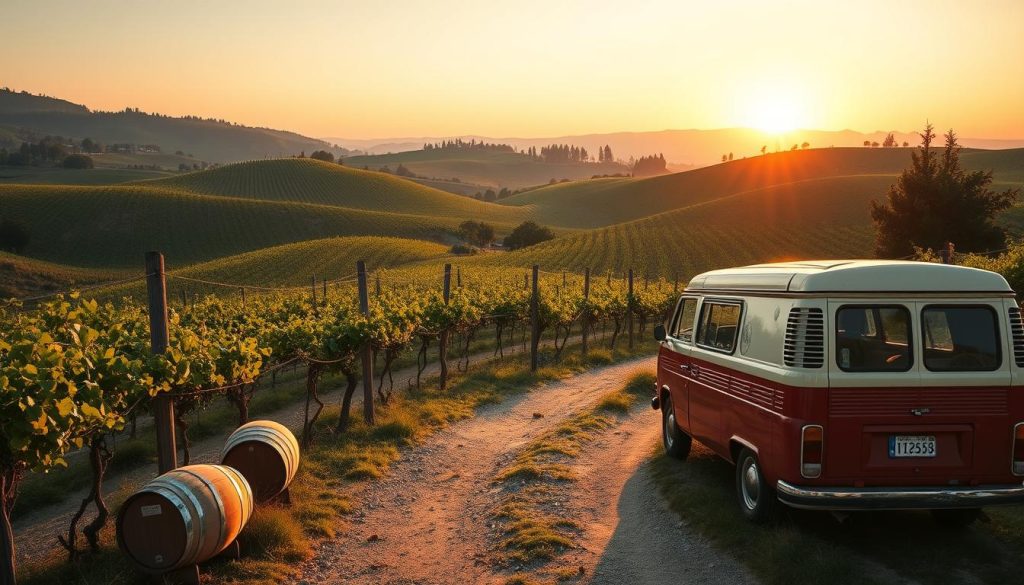
Starting a wine tour business in Piedmont needs careful planning. Knowing the local market is key. It helps shape your business. Also, understanding your competitors and customers is crucial for success.
Essential Considerations Before Launching
Before starting, think about these important points:
- Research local wineries and attractions for unique experiences.
- Check if there’s a demand for wine tours in your area and among tourists.
- Create a unique selling point to stand out.
Planning well sets a strong base for your business.
Legal Requirements and Licensing
Getting the legal side right is vital. Here are key steps:
- Register your business as required by local laws.
- Get permits for transport, food, and alcohol sales.
- Follow wine tour rules specific to Piedmont.
Dealing with local authorities and understanding rules is necessary. It ensures your business runs smoothly and legally.
Identifying Your Target Audience
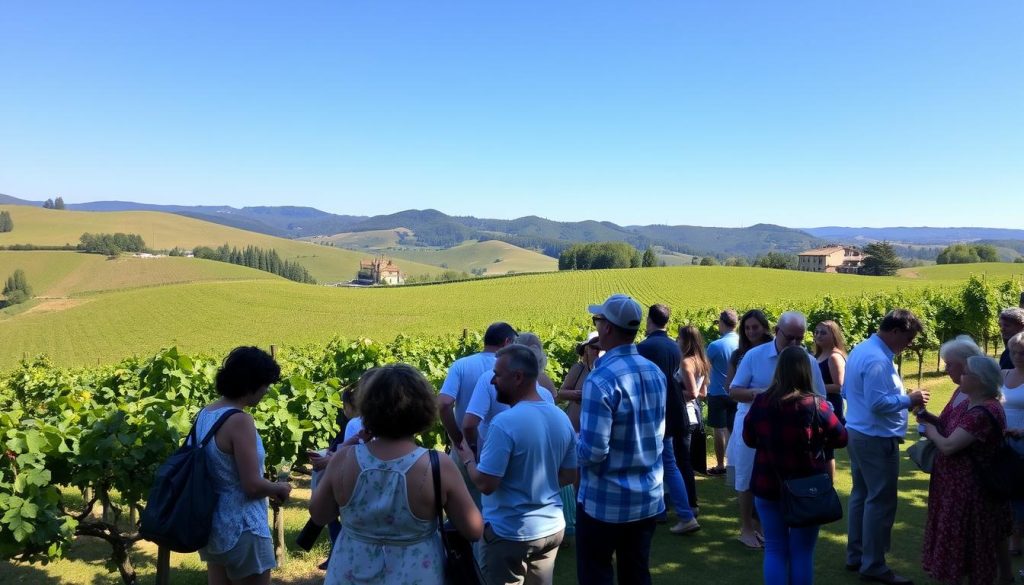
Understanding who you’re targeting is key to a successful wine tour in Piedmont, Italy. This region draws people with different reasons and hopes. By knowing your audience, you can offer experiences that speak to them.
Types of Wine Tour Participants
Wine tourism welcomes many types of visitors. Here are a few:
- Casual wine lovers who want fun and learning.
- Expert wine fans searching for top-quality wines.
- Trade professionals for networking and industry insights.
- Groups and corporate teams for wine-based team-building.
Understanding Customer Preferences
Market research helps us understand what customers like. Their tastes shape the wine tours. Key areas include:
- The types of wine they’re interested in, from reds to whites.
- Activities that make their wine tasting better, like vineyard tours and food pairings.
- Food interests, as many enjoy tours that highlight local cuisine.
By focusing on these, wine tour operators can create experiences that go beyond what customers expect. This leads to happier customers and keeps them coming back.
Creating a Business Plan
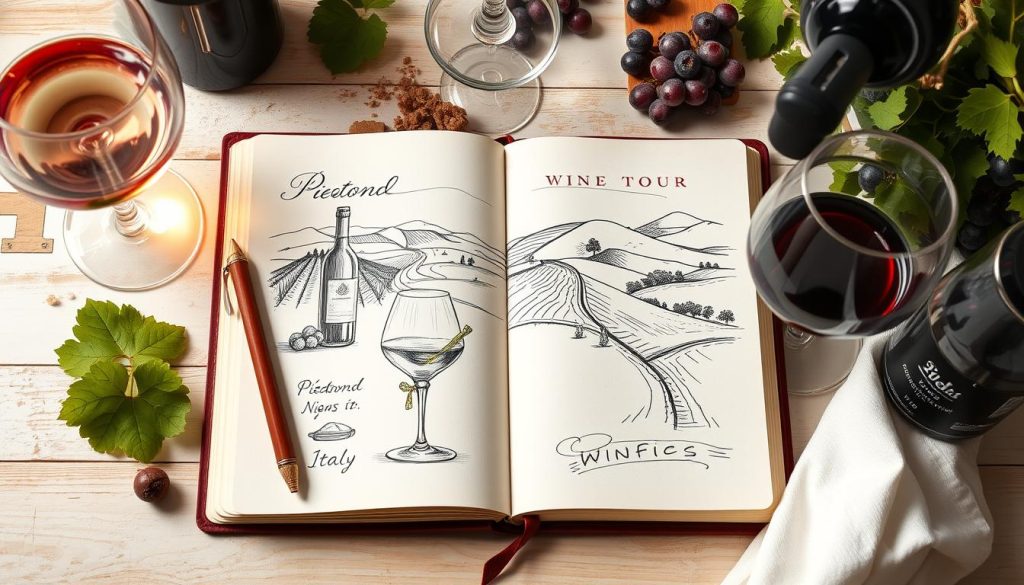
Starting a wine tour business needs a solid plan. This plan should outline your business model and what services you offer. You can choose from private tours or custom itineraries, depending on your customers’ needs. Setting clear goals, services, and prices helps you launch and grow your business.
Defining Your Business Model
A good business model is key to your success. Think about these options:
- Private group tours for a personal touch.
- Bespoke itineraries that mix local culture with wine.
- Corporate packages for team-building and client events.
Knowing your audience helps you tailor your services to their likes.
Budgeting and Financial Projections
Good budgeting keeps your business financially healthy. Consider these in your financial planning:
- Initial costs like marketing and equipment.
- Regular expenses like transport and staff pay.
- Expected income based on market research and prices.
Realistic financial plans help get funding and keep your business profitable.
Building Relationships with Local Wineries
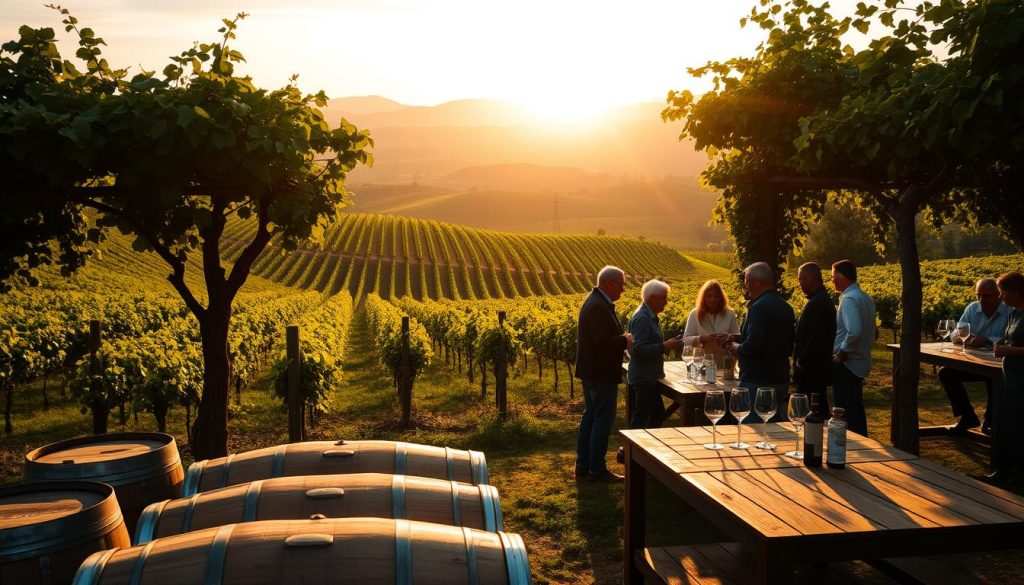
Starting a wine tour business in Piedmont means building strong ties with the wine community. Networking is key to making connections that improve your clients’ experiences. By attending local events, wine festivals, and trade shows, you can meet winery owners and staff. This opens doors for meaningful talks and possible partnerships.
Networking in the Wine Community
Networking well in the wine world can lead to great business partnerships. Here are some tips to help you:
- Join local wine events to find potential partners.
- Get involved in online forums or social media groups for wine lovers.
- Set up casual meetings with local wineries to talk about working together.
Establishing Partnership Agreements
Creating partnership agreements with local wineries can make your wine tours more valuable. These agreements can offer unique experiences like private tastings or vineyard tours. When making these agreements, remember to:
- Clearly state what each party’s role is.
- Detail the benefits each partner gets from the deal.
- Set up ways to keep in touch for ongoing talks.
By focusing on these points, you can build lasting relationships with local wineries. These relationships will make your tours better and give your clients memories to cherish.
Designing Memorable Wine Tour Experiences
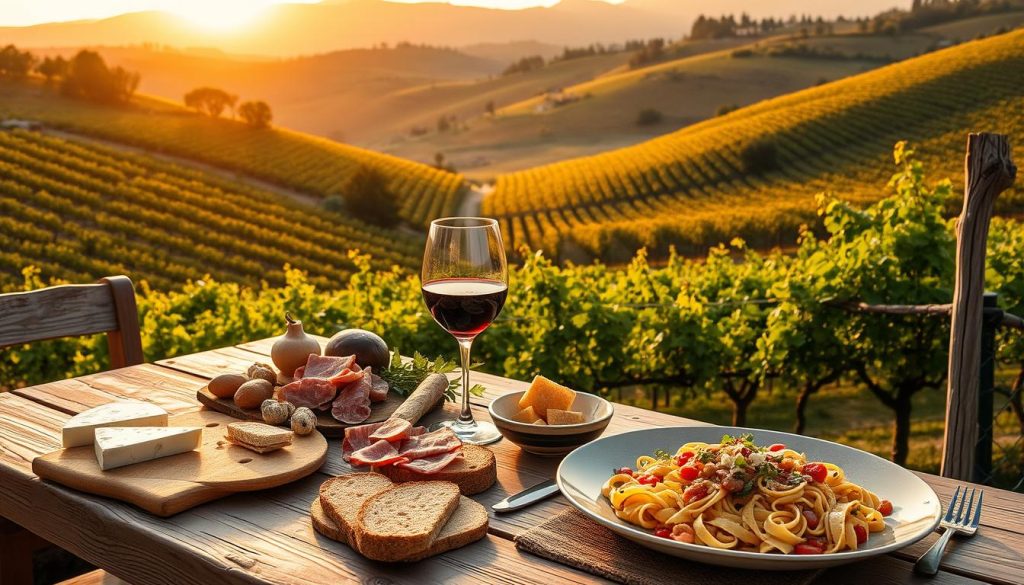
Creating engaging wine tours needs careful planning. This includes making a good itinerary and managing time well. A well-planned tour makes guests happy and ensures they enjoy every moment.
It’s important to balance travel time with tasting schedules. This way, guests can fully enjoy the wines and local food.
Itinerary Planning and Time Management
Good time management is key for smooth wine tours. When planning, remember these points:
- Give enough time for each winery visit and travel between them.
- Include breaks for relaxation and to explore the area.
- Be flexible to meet customer needs and any unexpected issues.
Adding different experiences to the tour makes it more interesting. Guests might enjoy visiting local markets or scenic spots. These add to their understanding of the wine’s background.
Incorporating Culinary Elements into Tours
Focusing on food can make your wine tours stand out. Wine and food pairing can make tastings better. It also lets guests try local dishes.
- Host cooking classes or demonstrations with local food.
- Offer tastings that pair wines with regional specialties.
- Visit local food artisans to meet producers and learn about their work.
Adding culinary touches makes the tour more memorable. A tour that combines wine tasting with food creates a lasting impression. It helps your wine tour business succeed.
Marketing Your Wine Tour Business
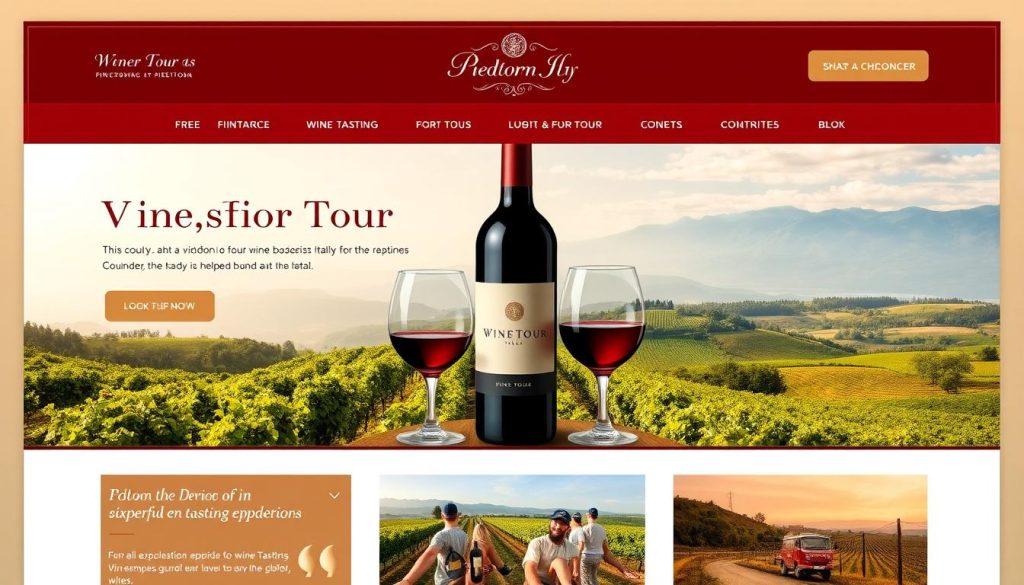
Creating a strong marketing plan is key for a wine tour business to thrive. Social media is a big help in finding new customers and making your brand lively. With smart digital marketing, you can get more people interested in your tours.
Utilising Social Media for Promotion
Platforms like Instagram and Facebook are great for wine tours. Pictures of vineyards, wine, and happy guests grab attention. Telling stories about your tours helps people feel a connection with your brand. Here are some tips:
- Post high-quality images and videos of your tours.
- Chat with your followers by asking questions and polls.
- Use targeted ads to find people who love wine.
Building an Informative Website
A good website is vital for attracting visitors. It should be easy to use, so people can find what they need quickly. Make sure your website has:
- A clear brand that shows what makes you special.
- Simple navigation with clear menus.
- Strong calls-to-action to book or ask questions.
- A user-friendly booking system for easy purchases.
Include all the details about your tours, like itineraries and what others say. A website is more than just a place to promote. It’s where customers can interact and find information, helping your business grow.
Utilising SEO Best Practices

Creating a successful wine tour business needs a strong online presence. Using SEO best practices boosts your visibility online. It draws more people to your site. By doing keyword research, you find the right words your audience looks for.
Keyword Research and Implementation
Keyword research is key to a good SEO strategy. Start by finding keywords related to wine tourism in Piedmont. Tools like Google Keyword Planner and SEMrush help understand search trends. Use these keywords in your website’s titles, headings, and content.
Choosing the right keywords helps your site rank higher. This attracts the right customers to your business.
Optimising Your Content for Search Engines
Optimising your content is crucial for good search rankings. Make sure to use keywords naturally, without making your content hard to read. Good meta descriptions can increase clicks, and a mobile-friendly site improves user experience.
Creating valuable content that answers questions boosts your authority. Adding internal and external links also helps build credibility. This encourages people to explore more of what you offer.
Leveraging Online Travel Platforms
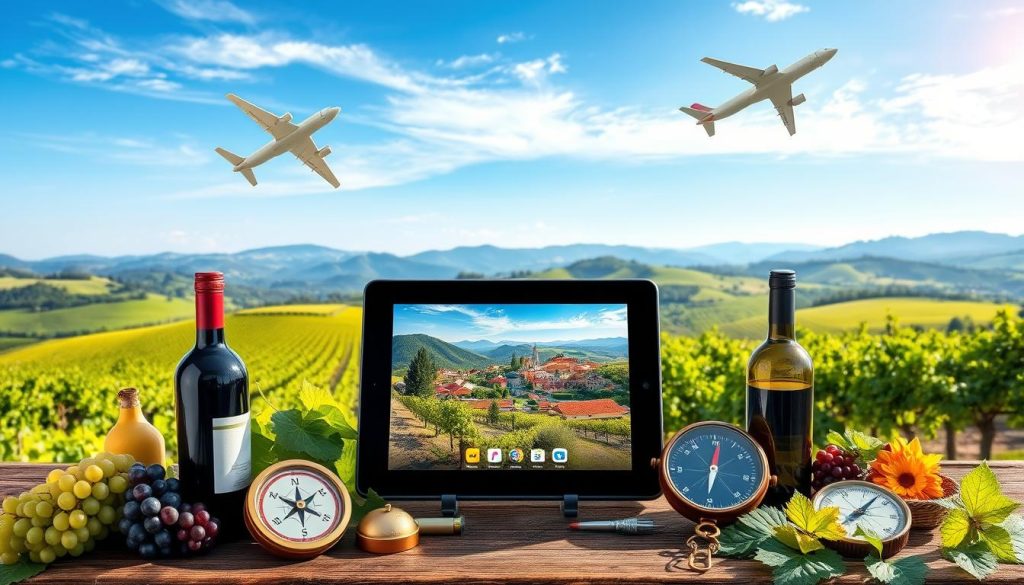
Using online travel platforms can really help your wine tour business grow. By teaming up with sites like TripAdvisor, Viator, and Airbnb Experiences, you reach more people. These sites are where many people plan their trips, so it’s a great way to get noticed.
Being part of these well-known platforms also makes your business look more credible. This can attract even more customers to your wine tours.
Partnering with Booking Sites
Building strong partnerships with booking sites is key to success in wine tourism. Working with big online travel platforms can really boost your business. These sites often have customer reviews that help improve your reputation.
Some benefits include:
- Reaching more people through targeted marketing.
- Easy booking for customers, making their experience better.
- Being more visible online, thanks to SEO on travel sites.
Importance of Customer Reviews and Testimonials
Customer feedback is very important for your business. Happy customers sharing their good experiences can attract new visitors. Good reviews build trust and improve your reputation.
Here are some ways to get more feedback:
- Send emails after the tour to ask for reviews.
- Give discounts to guests who share their tour experiences.
- Always reply to reviews, showing you care about customer satisfaction.
Delivering Exceptional Customer Service
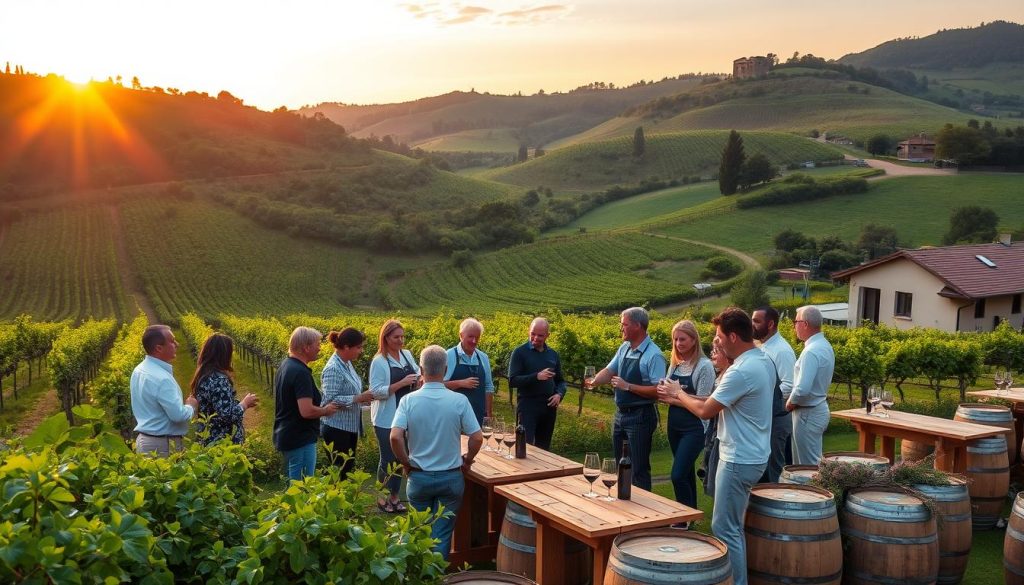
Outstanding customer service is key for a wine tour business’s success. Thorough staff training ensures guides know about wines, safety, and how to interact with people. By following high standards, businesses can make unforgettable experiences for their guests.
Training Your Staff for Wine Tours
Effective staff training is the base for great customer service. It should cover wines, local vineyards, and the region’s history. This knowledge helps guides connect better with customers.
Training should also include:
- Communication skills for better guest interactions
- Safety protocols for a safe tour environment
- Knowledge of customer service standards for a welcoming atmosphere
Handling Customer Feedback and Complaints
Managing customer feedback is vital for service improvement. Handling both positive and negative comments helps meet guests’ needs. Effective complaint handling builds loyalty and satisfaction.
Here are some strategies to improve this:
- Listen actively to show understanding and empathy
- Have a clear plan to solve complaints
- Use feedback to improve services, based on what guests say
Safety and Compliance Considerations
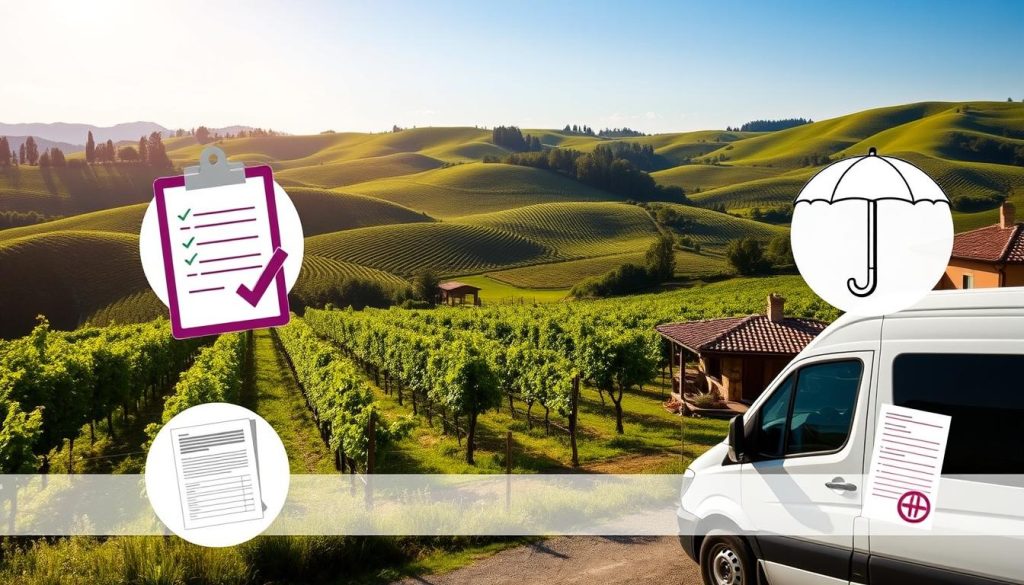
Keeping guests safe is crucial for any wine tour business. It not only protects them but also boosts your reputation. Knowing about business and liability insurance is key to managing risks.
Insurance and Liability Issues
Good business insurance shields your company from many risks in the tourism world. Important types include:
- General liability insurance for claims of injury or damage to others’ property.
- Specific liability insurance for accidents during wine tours.
- Insurance for guest transport, keeping them safe while moving to and from wineries.
It’s important to have plans in place to spot and prevent hazards during tours. This way, you create a safe space for everyone involved.
Health and Safety Regulations
Following health and safety rules is more than just a law. It shows the quality of your service. Focus on:
- Keeping transport safe and drivers trained.
- Following food safety rules, especially when serving meals on tours.
- Having clear safety rules for activities at the vineyard.
Staying in line with tourism standards builds trust and satisfaction. This helps your brand image a lot.
Expanding Your Wine Tour Offerings
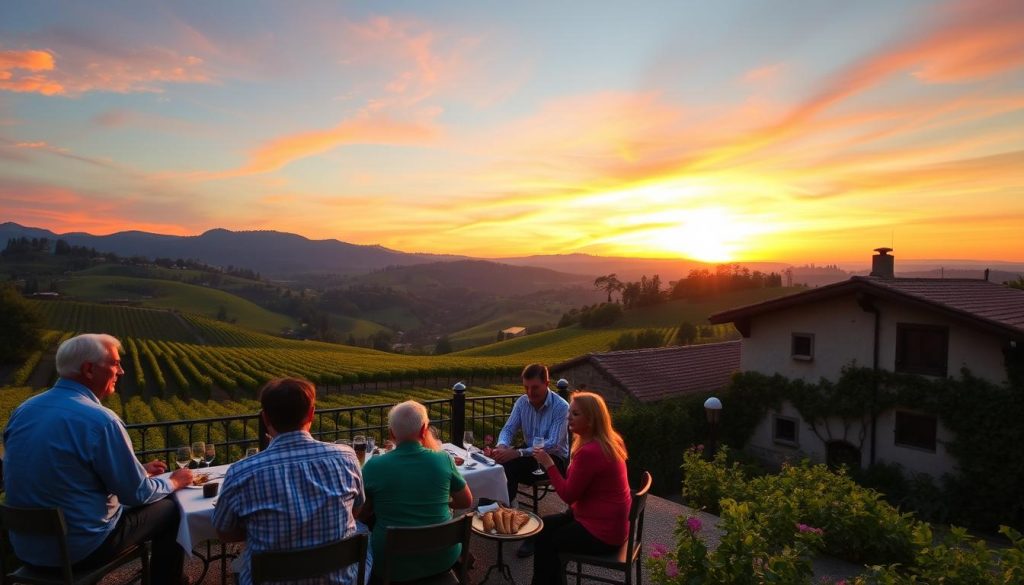
Adding more to your wine tours can draw in more people and make more money. By offering different activities and special packages, you make your tours more appealing. Things like vineyard picnics, cooking classes, or truffle hunting are great ways to make your tours stand out.
Add-on Activities and Packages
Here are some ideas for add-on activities to make your tours better:
- Vineyard picnics where guests can enjoy local wines with gourmet foods.
- Cooking classes with famous chefs, teaching how to make traditional Piedmont dishes.
- Truffle hunting excursions, a fun way to find hidden local treasures.
These activities make your tours more special and memorable. They also help your business be unique, offering things you can’t find elsewhere.
Collaborations with Local Chefs and Artisans
Working with local chefs and artisans can create unforgettable food experiences. These partnerships offer chances for:
- Hosting special tasting events with local food and top wines.
- Organising culinary festivals to show off local culinary talents and wine pairings.
- Creating special packages that highlight local artisans, letting guests dive into the local culture.
These collaborations with chefs and artisans make your wine tours even better. They also help showcase local talent, giving visitors a true taste of the area.
Understanding Seasonal Trends in Wine Tourism
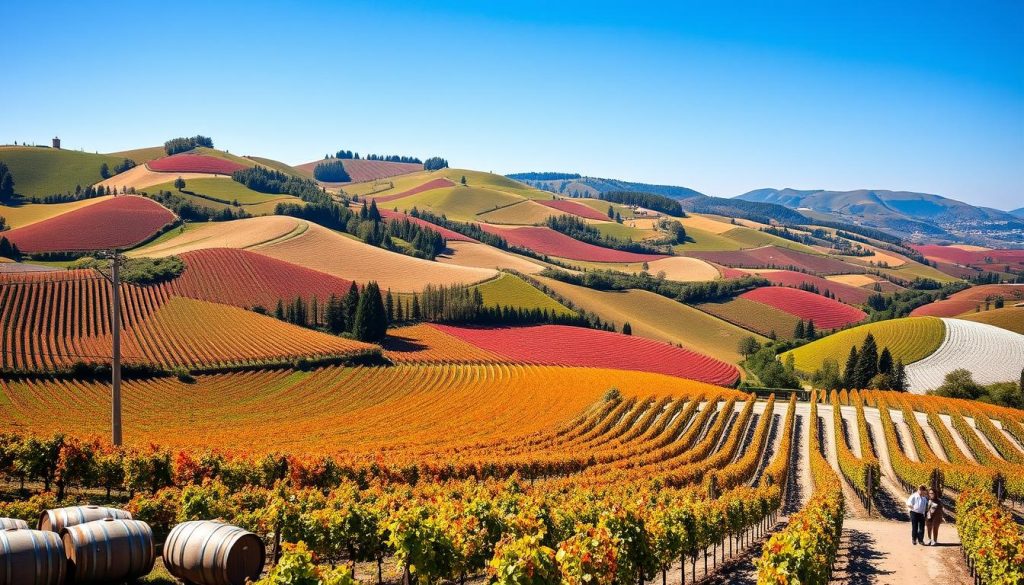
Seasonal trends play a big role in wine tourism in Piedmont. Knowing when the most people visit helps businesses plan better. This ensures they meet the needs of their guests and run a successful tour.
Peak Seasons for Wine Tours
Wine tourism in Piedmont has its busy times. These include:
- Autumn’s harvest season, when tourists see grape-picking and taste new wines.
- Spring festivals that highlight local vineyards and offer wine tastings.
- Summer, with its nice weather, is perfect for vineyard visits and outdoor meals.
These busy times mean businesses need to plan ahead. They should be ready to change what they offer to meet the demand. This way, they can attract more visitors.
Adjusting Your Offering Based on Demand
Being flexible with services is key in the wine tourism world. Here are some tips:
- Change tour times to match the busy seasons.
- Adjust prices based on how busy it is.
- Use special promotions to draw in visitors when it’s quiet.
Making smart changes to services and marketing can keep customers happy. It also helps businesses stay open all year. By planning well for the seasons, a wine tour business can thrive in Piedmont’s lively tourism scene.
Networking with Other Wine Tour Operators
In the world of wine tourism, networking is key. It opens doors to growth and visibility. By working together, businesses can share strengths and learn from each other. This makes them stronger in the market.
These connections help keep up with trends and what customers want. They also bring new ideas to improve services. It’s a win-win for everyone involved.
Working together on marketing can reach more people. This way, costs are split, making it more affordable. It also builds a community of support among operators.
This support can lead to more customers through referrals. It’s a great way to grow together. Networking is essential for success in wine tourism.

